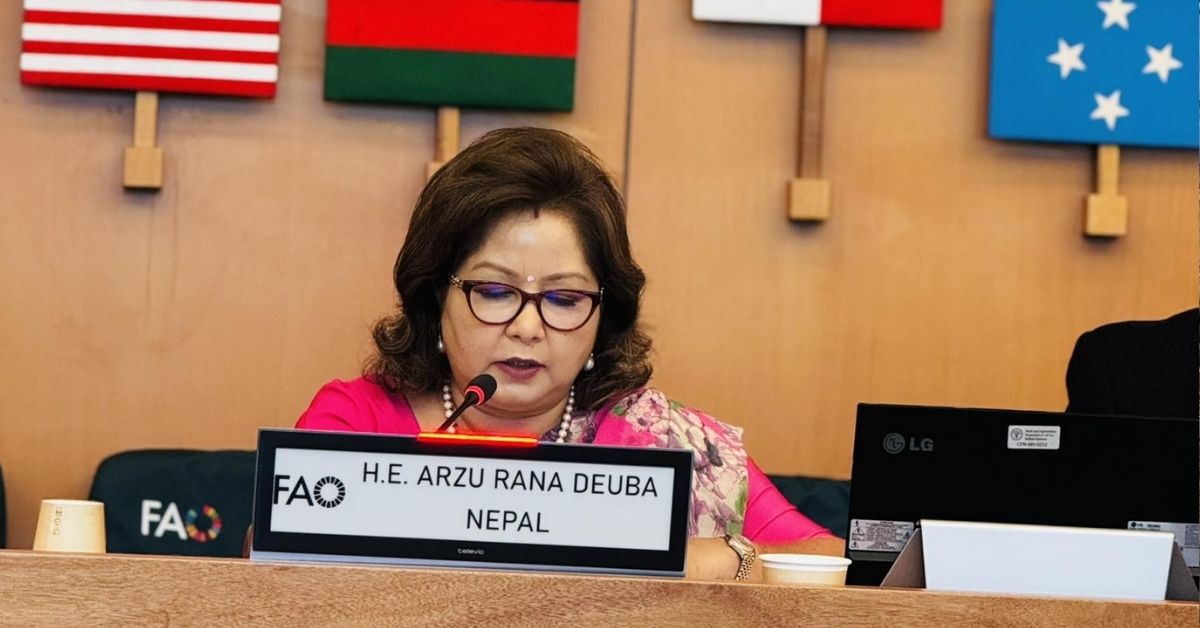
It is my great honour to represent Nepal in this discussion on nutrition and development. Nutrition is not only the core of SDG 2—Zero Hunger, but a critical enabler of every Sustainable Development Goal, as it is a foundation for a productive workforce and economic growth; and contributes to good health, quality education, gender equality and resilience and reduced inequalities.
For countries like mine – LDC, LLDC, and climate-vulnerable mountainous nations, linking across the sectoral agenda is imperative.
Over the past two decades, Nepal has made notable progress. Child stunting has declined from 57% to 25%. Underweight decreased from 42% to 24% and child wasting from 15% to 8%. Our Global Hunger Index (GHI) score has dropped from 37 in 2000 to 22.4 in 2024. These are not just statistics. They are the result of strong political commitment, community engagement, and coordinated efforts across sectors.
Getting into the specific questions directed at me: Nepal has adopted a range of policy instruments to transform its food systems-focusing on diversifying production, reducing food loss, and enhancing food safety, particularly for perishable nutritious foods.
Nepal’s Constitution recognizes the right to food as a fundamental right. The Right to Food and Food Sovereignty Act (2018) provides a legal foundation for its realization. In line with this, we are implementing the Food Systems Transformation Strategic Plan (2022–2030), a country led strategy developed in response to the UN food system summit, which promotes inclusive and resilient food systems aligned with our national and global commitments.
Our Agriculture Development Strategy (2015–2035) and Sixteenth Periodic Plan (2024/25-2028/29), promote crop diversification and fortification, organic farming, and climate-smart technologies. These strategies greatly focus on the revitalization of indigenous food systems and promoting high-altitude crops like millet, barley, buckwheat, beans etc., which are well adapted to our mountainous ecology and rich in nutrients. These support both nutrition and biodiversity conservation.
Through nutrition-sensitive agriculture, we are promoting production & consumption of diverse, nutrition rich foods; supporting homestead gardening & small-scale livestock farming, improving food safety & hygiene.
Nepal is putting hard efforts to promote collective farming, modernize post-harvest system, value chain development & improving the postharvest infrastructure.
We are also leveraging digital innovation- including early warning systems, advisory platforms and market intelligence to minimize post-harvest losses and enhance small holders linkages to value chains.
Our Food Safety and Quality Act (2024) and the Food Safety and Quality Control Policy help ensure safe and quality food through regulatory standards, lab surveillance, and consumer protection. We have a separate Consumer Court to safeguard consumer rights which also helps to ensure trust in local food systems.
Production and supply are only half the equation. Nepal is consistently pursuing generation of greater consumer demand for healthy diets.
Our National Nutrition Policy (2020), Food-Based Dietary Guidelines and Multi-Sector Nutrition Plan II bring food-based interventions into health, education and agriculture.
Programs like vitamin ‘A’ supplementation, golden 1000 days program have reached millions of children across the country, contributing to the reduction of child mortality rate and undernutrition.
Awareness and behavior change campaigns are being scaled up through schools, media, and health services to promote healthy eating habits.
School curriculum-based nutrition education is helping shift food preferences toward fresh, local produce.
Our Home-Grown School Feeding Program exemplifies how nutrition, education, and local farming can come together in a virtuous cycle.
Social protection programs, including child grants, further enable poor and vulnerable households to access nutritious food.
However, our path is not without challenges.
Youth migration continues to deplete our rural labour force, leading to the growing feminization of agriculture, where women bear increasing responsibilities without adequate support.
Human-wildlife conflict in hilly & mountainous region has become an increasing threat to livelihood & food security.
Land fragmentation, barren land in hills & mountains due to out migration of male members of family is increasing & we are putting our efforts to pilot the land bank concept & land and crop pooling, which still needs to be expanded and institutionalized.
Nepal have made strides in grassroots innovation; however, we still lack access to modern sciences and advanced technologies such as AI, digital agriculture platforms, and precision tools, which could modernize traditional farming, improve yields, and reduce losses.
These technologies are essential to attract youths back into agriculture, reduce drudgery, and make farming more rewarding.
Being a mountainous country, vulnerability to climate change is the most pressing challenge. Glacier retreat, erratic rainfall, extreme weather events and climate induced disasters are increasingly threatening yields and livelihoods. Without urgent action, mountain farming, and the ecosystems it supports, will only deteriorate.
Nepal recently hosted the Sagarmatha Sambaad, a global dialogue on climate and mountains. We called for innovative, grant-based climate financing to protect agriculture and food systems in fragile ecologies like ours.
Nepal’s strategic geopolitical location between two of the world’s largest markets offer a unique opportunity to harness its agricultural potential for regional trade and economic growth.
With diverse agro- climatic zone and micro climate, for high value crops, Nepal can serve as niche-based supplier of mountain and ecofriendly products.
Besides that, we see enormous potential in our rich agro-biodiversity, traditional knowledge, and high-altitude crops and food systems that are both climate-resilient and nutritionally rich. But to unlock this, we need targeted investment, technical cooperation, innovation and access to advanced technologies such as AI.
We call for stronger international collaboration, accessible finance, technology transfer and knowledge sharing to ensure that no country, and no person, is left behind in our collective journey toward better nutrition and development. We should promote South-South and North-South partnerships.
I also emphasize the critical role of international organizations like FAO and UNICEF in guiding solutions in this regard.
(The article is the edited version statement delivered by Foreign Affairs Minister of Nepal, Dr. Arzu Rana Deuba, during the Forty-Fourth Session of the Food and Agriculture Organization
High-Level Ministerial Special Event in Rome, Italy on June 29.)